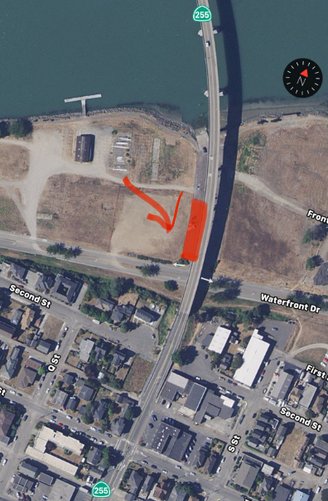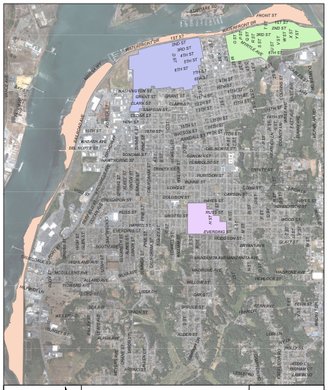
One of the proposed locations for HACHR’s mobile syringe exchange, under the Samoa Bridge | Image from HACHR’s proposal submitted to the City of Eureka
Following a string of meetings surrounding the syringe exchange program (SEP) operated by the Humboldt Area Center for Harm Reduction (HACHR), the Eureka City Council will again discuss the controversial topic and will consider allowing HACHR to operate a mobile needle exchange in the city during the pandemic.
HACHR is currently not permitted to offer syringe exchange services within the City of Eureka, after the council voted last month to temporarily ban SEPs until it could rewrite and adopt a new ordinance governing them. Though the county — not subject to the city’s jurisdiction — has continued to operate a syringe exchange in Eureka and even expanded the program’s hours, there have been concerns that the county’s syringe exchange alone cannot provide the level of service necessary to help prevent blood-borne disease and other health issues related to intravenous drug use, especially during the pandemic.
At its Jan. 6 meeting, the council adopted a resolution allowing for mobile-only SEPs to operate within city limits during the COVID-19 emergency and requiring all applicants to submit an operations plan for review. The emergency resolution also requires that programs adhere to a one-for-one exchange rate — dispensing only one new needle for every used one handed in — and cap the amount of credit someone may accrue at 100 needles.
On Tuesday, the council will review HACHR’s proposal for an emergency mobile SEP, the first and only proposal the city has received so far. The plan proposes to offer services for two to four hours, three days a week and proposes several different locations for parking the outreach vehicle, including under the Samoa Bridge, near the Hikshari’ Trail off of Hilfiker, the Humboldt Waste Management Authority (HWMA) parking lot and around the corner from the St. Vincent De Paul free meal.
In the proposal, HACHR also states that the program would adhere strictly to the one-for-one exchange and the credit cap, but condemns the restrictions, saying they are only implemented for the purpose of “optics” and “community relations” and go against the policies of harm reduction.
“HACHR will abide by the parameters of the Emergency Resolution Amendment voted into effect by city council on 1/5/21 under duress, as this amendment is not based in science nor the recommendations of the CDC or CDPH Office of AIDS, and does not take into account the needs of our service population,” the proposal states.
HACHR Executive Director Lasara Firefox Allen told the Outpost that, although the nonprofit does not support the restrictions adopted by the council, the organization will do whatever it takes to provide syringe exchange services. “As always, we are dedicated to serving our population in the safest way possible,” they said.
Before the council voted to suspend SEPs, HACHR had agreed to move to a mobile exchange and discontinue the service at its location on Third Street, but asked for six months to make the transition. When asked how HACHR will be able to provide the service now, Allen said that it will be very challenging. The nonprofit only has one vehicle, which is not in great shape and only holds two people, they said. Allen added that without the time to plan for this change, the transition to operating a mobile exchange may require HACHR to reduce hours and services offered at the brick and mortar location. “It would have been immensely more graceful to have had more time,” Allen said.
Eureka City Manager Miles Slattery told the Outpost on Wednesday that, although he was concerned about the condescending tone of the proposal, he is recommending approval. The proposal meets all of the guidelines, with the exception of two of the proposed locations — the HWMA parking lot and the lot near Hilfiker — which are both nearly environmentally sensitive habitats, Slattery said.
“We welcome any other proposals, because the more harm reduction we can have the better,” Slattery added. “As long as they can comply, it would be great to have more [syringe exchange] services.”
###
In other business, the council will vote — again — on an ordinance that would ban public camping in the city during daylight hours and during any hours in parks, near trails and in several business districts. The ordinance would replace the city’s existing anti-camping ordinance, bringing the city into compliance with a court ruling on camping bans.

Map of districts where camping would be prohibited during nightime hours | From the City of Eureka
Sound familiar? Well, that’s because the council already voted 4-1 to adopt the ordinance at a meeting on Dec. 1. But according to the staff report, the vote was ineffective “due to a technical error on the posted agenda.” The council was scheduled to reconsider the ordinance at its last meeting, but pushed the item to its next meeting because of the lengthy debate on syringe exchange.
Usually taking the vote again would probably be pretty straightforward, but with two new council members since the last vote, the topic may require a bit of additional discussion. This also means the item is again open for public comment and advocates for the houseless are urging people to show up to the meeting, in the hopes that the council will reconsider its vote entirely. You can find more information in this press release from the Legal Services of Northern California.
The Eureka City Council will meet on Tuesday, Jan. 19 at 6:00 p.m. You can view the agenda and directions on how to participate here.
You can view HACHR’s proposal for emergency SEP services here.
###
PREVIOUSLY:
- Eureka City Council to Consider Supporting Needle-Exchange Program
- Eureka City Council Members Question Whether HACHR’s Syringe Exchange Program is ‘The One’ for the City
- STATE OF EUREKA: Following Citizen Outcry, the City is Ratcheting Up the Pressure on Needle Litter (and Hoping Things Won’t Snap)
- City of Eureka Announces Opposition to HACHR Recertification, Releases Lengthy Report Chronicling Months-Long Undercover Surveillance
- HACHR Releases Statement Detailing Steps It Plans to Take Moving Forward
- Eureka City Council to Discuss HACHR’s Syringe Exchange Program; Consider Grant Funding to Aid Bars, Restaurants and Retailers Adapting to COVID-19
- Eureka City Council Approves Letter Opposing the Reauthorization of HACHR’S Syringe Exchange Program
- State Reauthorizes HACHR’s Syringe Exchange Program, But Gives Eureka More Control
- Eureka City Council Set to Finalize Agreement With Needle-Exchange Program, Clear Remaining Red Tape on Betty Chinn Trailer Village off South Broadway
- Eureka City Council Votes Down Proposed HACHR Agreement, But Will Reconsider Vote Tonight
- Eureka City Council to Consider Temporary Ban on Syringe Exhange Programs, After Rejecting Proposed HACHR Agreement
- Eureka City Council Temporarily Bans Syringe Exchange Operated by HACHR
- HACHR Blasts Eureka Council Majority in Wake of Last Night’s Decision; Vows to Keep Fighting; Says ‘The Time For Compromise is Over’
- (AUDIO) HUMBOLDT HOLDING UP: HACHR Executive Director Discusses Recent Eureka City Council Decision, the Importance of Syringe Exchange Programs and Harm Reduction
- HACHR Says It Will Offer Syringe Exchange Services Just Outside Eureka City Limits Starting Wednesday
- HACHR Offering Home Delivery for Syringe Exchange Outside Eureka, Backs Away from Plan to Set Up Near City Limits
- Eureka City Council to Consider Allowing Mobile Syringe Exchange During the Pandemic, Discuss Caltrans’ Richardson Grove Project, Vote Again on Anti-Camping Ordinance
- Eureka City Council Unanimously Approves Mobile Syringe Exchanges During the Pandemic
CLICK TO MANAGE